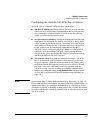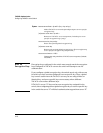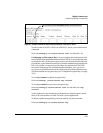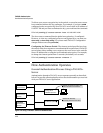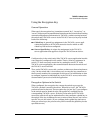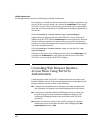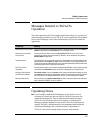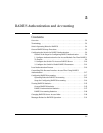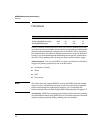
TACACS+ Authentication
How Authentication Operates
Local Authentication Process
When the switch is configured to use TACACS+, it reverts to local authentica-
tion only if one of these two conditions exists:
■ “Local” is the authentication option for the access method being used.
■■ TACACS+ is the primary authentication mode for the access method
being used. However, the switch was unable to connect to any
TACACS+ servers (or no servers were configured) and Local is the
secondary authentication mode being used.
(For a listing of authentication options, see table 4-2, “Primary/Secondary
Authentication Table” on 4-13.)
For local authentication, the switch uses the operator-level and manager-level
username/password set(s) previously configured locally on the switch. (These
are the usernames and passwords you can configure using the CLI password
command, the web browser interface, or the menu interface—which enables
only local password configuration).
■■ If the operator at the requesting terminal correctly enters the user-
name/password pair for either access level, access is granted.
■■ If the username/password pair entered at the requesting terminal does
not match either username/password pair previously configured
locally in the switch, access is denied. In this case, the terminal is
again prompted to enter a username/password pair. In the default
configuration, the switch allows up to three attempts. If the requesting
terminal exhausts the attempt limit without a successful authentica-
tion, the login session is terminated and the operator at the requesting
terminal must initiate a new session before trying again.
Note- The switch’s menu allows you to configure only the local Operator and
Manager passwords, and not any usernames. In this case, all prompts for local
authentication will request only a local password. However, if you use the CLI
or the web browser interface to configure usernames for local access, you will
see a prompt for both a local username and a local password during local
authentication.
4-22




